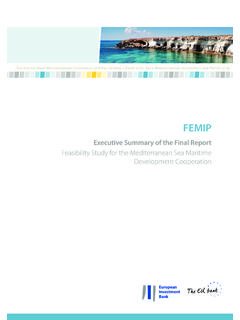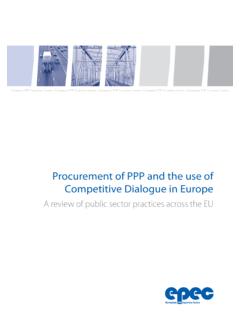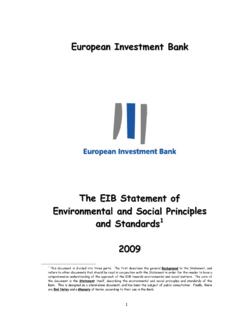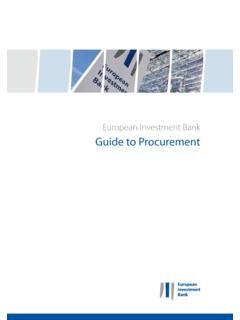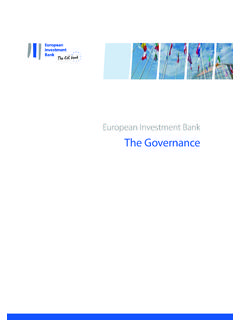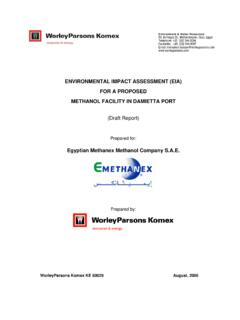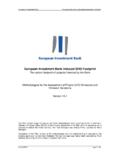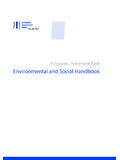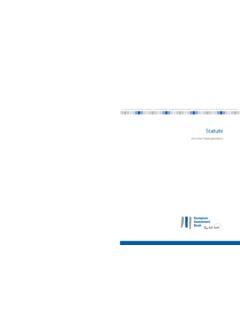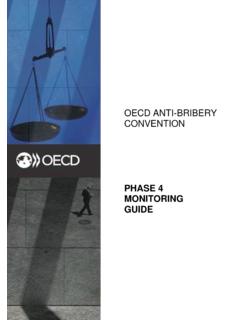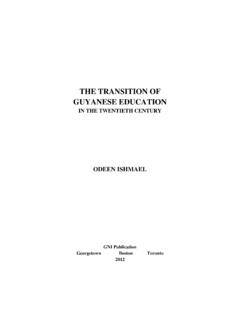Transcription of Anti-Fraud Policy - European Investment Bank (EIB)
1 European Investment Bank Anti-Fraud PolicyPolicy on preventing and deterring prohibited conduct in European Investment Bank activitiesEuropean Investment Bank Anti-Fraud Policy 17 September 2013 page 1 / 13 Policy ON PREVENTING AND DETERRING PROHIBITED CONDUCT IN European Investment BANK ACTIVITIES ( EIB Anti-Fraud Policy ) EIB will not tolerate Prohibited Conduct ( corruption , fraud , collusion, coercion, obstruction, money laundering and terrorist financing) in its activities or operations. Allegations may be reported by telephone (to +352 4379 87441), by fax (to +352 4379 64000) or by e-mail to Alternatively, allegations can be reported directly to the European Anti-Fraud Office (OLAF).
2 I. PREAMBLE 1. This document sets forth the Policy of the European Investment Bank (EIB or the Bank) in preventing and deterring corruption , fraud , collusion, coercion, obstruction, money laundering and terrorist financing (jointly Prohibited Conduct ) in EIB activities. It updates and replaces EIB s Anti-Fraud Policy dated 8 April 2008. 2. The legal basis for the EIB Anti-Fraud Policy and the authority for EIB to conduct investigations stems from: (i) Article 325 of the Treaty on the Functioning of the European Union (TFEU); (ii) Article 18 of the EIB Statute; (iii) Council Regulation (EC, Euratom) No 966/2012 of 25 October 2012; (iv) EIB Board of Governors Decision of 27 July 2004 concerning EIB s cooperation with OLAF.
3 3. Created by the Treaty of Rome, the EIB is the financing body of the European Union. As such, the Bank operates in accordance with the EU legal framework and is bound by the EIB Statute, Article 18 of which states that: In its financing operations, the Bank shall [..] ensure that its funds are employed as rationally as possible in the interests of the Union. 4. The Bank shall therefore ensure that its loans are used for the purposes intended. In this context, the Bank shall endeavour to ensure that its activities are free from Prohibited Conduct. 5. Consequently, the Bank will work to prevent and deter Prohibited Conduct from occurring and, where it does occur, will address it in a timely and expeditious manner.
4 To this end, investigation procedures shall also be adopted. 6. In this regard and in seeking to align its policies and procedures with international practice, the Bank is cognisant of the principles enshrined in: (i) the United Nations European Investment Bank Anti-Fraud Policy 17 September 2013 page 2 / 13 Convention Against Corruption1; (ii) the Organisation for Economic Co-operation and Development s Convention on Combating Bribery of Foreign Public Officials in International Business Transactions2; (iii) the Council of Europe Criminal Law Convention on Corruption3; (iv) the Financial Action Task Force s Recommendations4.
5 And (iv) the International Financial Institution s (IFIs) anti - corruption Task Force s Uniform Framework Agreement5. II. BASIC PRINCIPLES 7. EIB members of governing bodies and staff, EIB s project related parties, counterparts and partners (both as defined in para. 9 below) shall maintain the highest level of integrity and efficiency in all EIB activities. EIB will not tolerate Prohibited Conduct in its activities. 8. (i) Any Prohibited Conduct that occurs is to be reported promptly and investigated thoroughly and fairly; wrongdoers are to be sanctioned in accordance with applicable policies and procedures; and appropriate legal steps are to be taken to recover misapplied funds.
6 (ii) The Bank s Inspectorate General, through its fraud Investigations Division, investigate allegations of Prohibited Conduct. (iii) The fraud Investigations Division of EIB shall work in close partnership with OLAF. III. SCOPE OF THE Policy 9. This Policy applies to all EIB activities, including projects financed by the EIB using third party resources and procurement for the Bank s own account. It applies to the following persons and entities: a. The members of EIB Board of Directors, the Management Committee, staff and consultants, without regard to their position, rank, or length of service (referred to herein as EIB members of governing bodies and staff ); b.
7 Borrowers, promoters, contractors, sub-contractors, consultants, suppliers, beneficiaries (as the case may be), and in general relevant persons or entities involved in EIB-financed activities (referred to herein as Project related parties ); c. Consultants, suppliers, service providers and other persons or entities procured by EIB for its own account; and d. All counterparties and others through which the EIB deals in its borrowing or treasury activities (c. and d. jointly referred to herein as EIB other counterparts and partners ). 1 2 3 4 5 European Investment Bank Anti-Fraud Policy 17 September 2013 page 3 / 13 IV.
8 DEFINITIONS 10. In pursuance of this Policy , Prohibited Conduct includes corruption , fraud , coercion, collusion, obstruction, money laundering and financing of terrorism defined as follows:6 a. A corrupt practice, which is the offering, giving, receiving, or soliciting, directly or indirectly, anything of value to influence improperly the actions of another party. b. A fraudulent practice, which is any act or omission, including a misrepresentation that knowingly or recklessly misleads, or attempts to mislead, a party to obtain a financial or other benefit or to avoid an c. A coercive practice, which is impairing or harming, or threatening to impair or harm, directly or indirectly, any party or the property of the party to influence improperly the actions of a party.
9 D. A collusive practice, which is an arrangement between two or more parties designed to achieve an improper purpose, including influencing improperly the actions of another party. e. An obstructive practice is (a) deliberately destroying, falsifying, altering or concealing of evidence material to the investigation; and/or threatening, harassing or intimidating any party to prevent it from disclosing its knowledge of matters relevant to the investigation or from pursuing the investigation, or (b) acts intended to materially impede the exercise of the ElB's contractual rights of audit or access to information or the rights that any banking, regulatory or examining authority or other equivalent body of the European Union or of its Member States may have in accordance with any law, regulation or treaty or pursuant to any agreement into which the EIB has entered in order to implement such law, regulation or treaty.
10 Money laundering and financing of terrorism are defined in EC Directives8 on the prevention of the use of the financial system for the purpose of money laundering and terrorist financing, as amended and supplemented from time to time (hereafter AML/CFT Directive ), as follows: f. Money laundering is (i) the conversion or transfer of property, knowing that such property is derived from criminal activity or from an act of participation in such activity, for the purpose of concealing or disguising the illicit origin of the property or of assisting any person who is involved in the commission of such activity to evade the legal consequences of his action.
